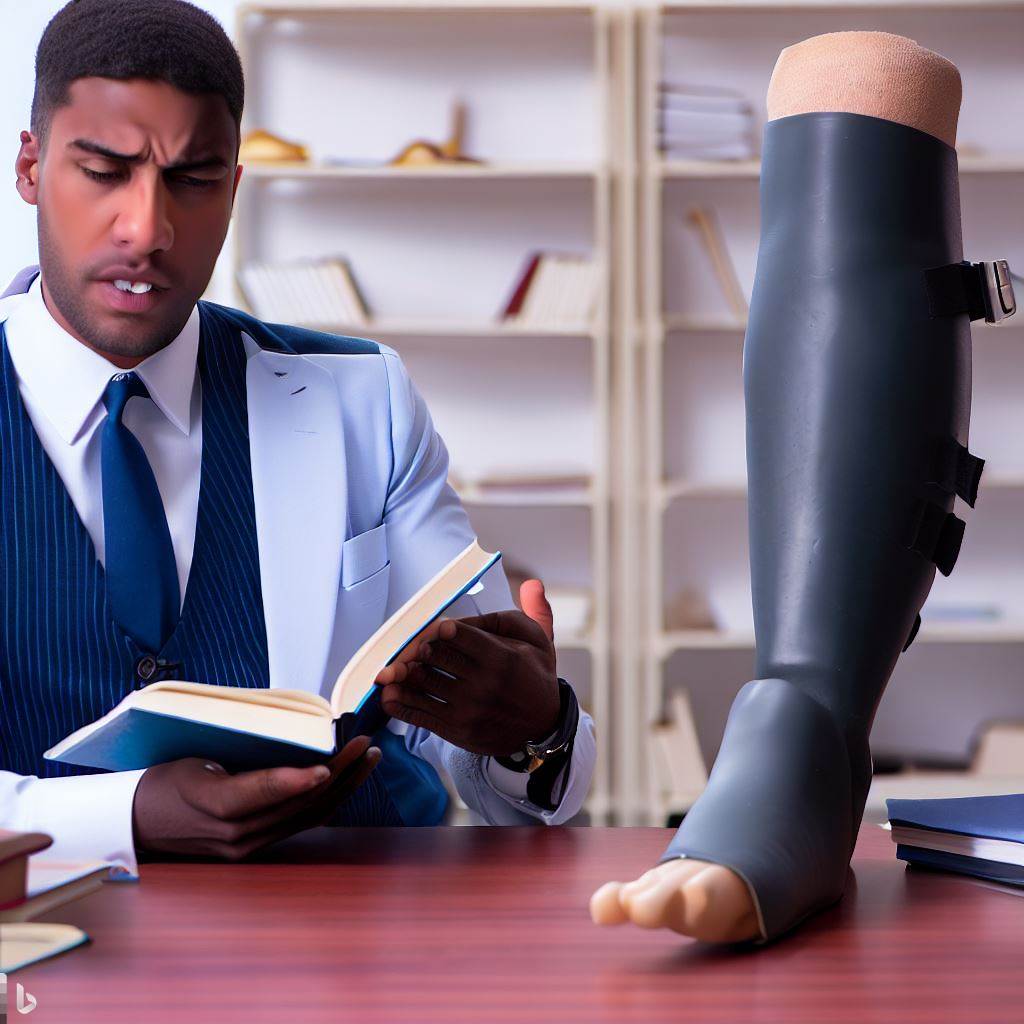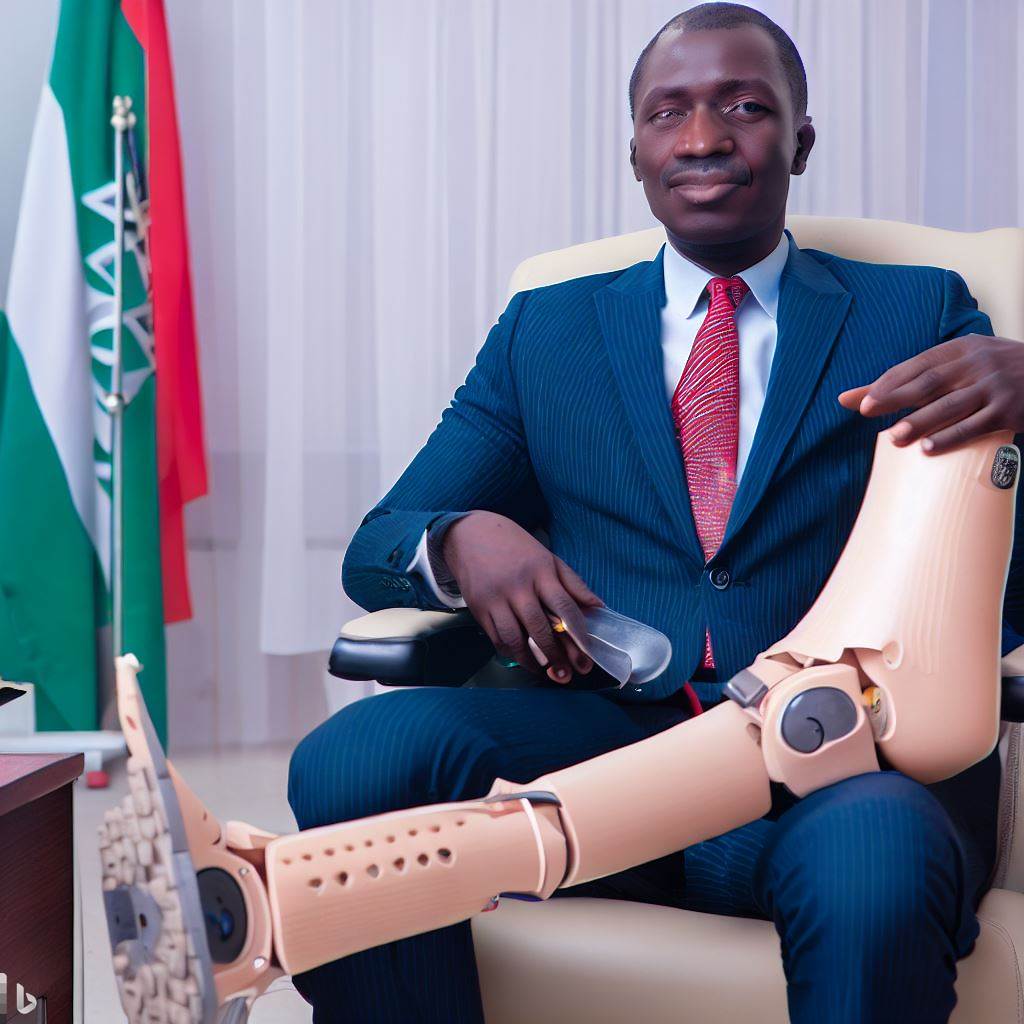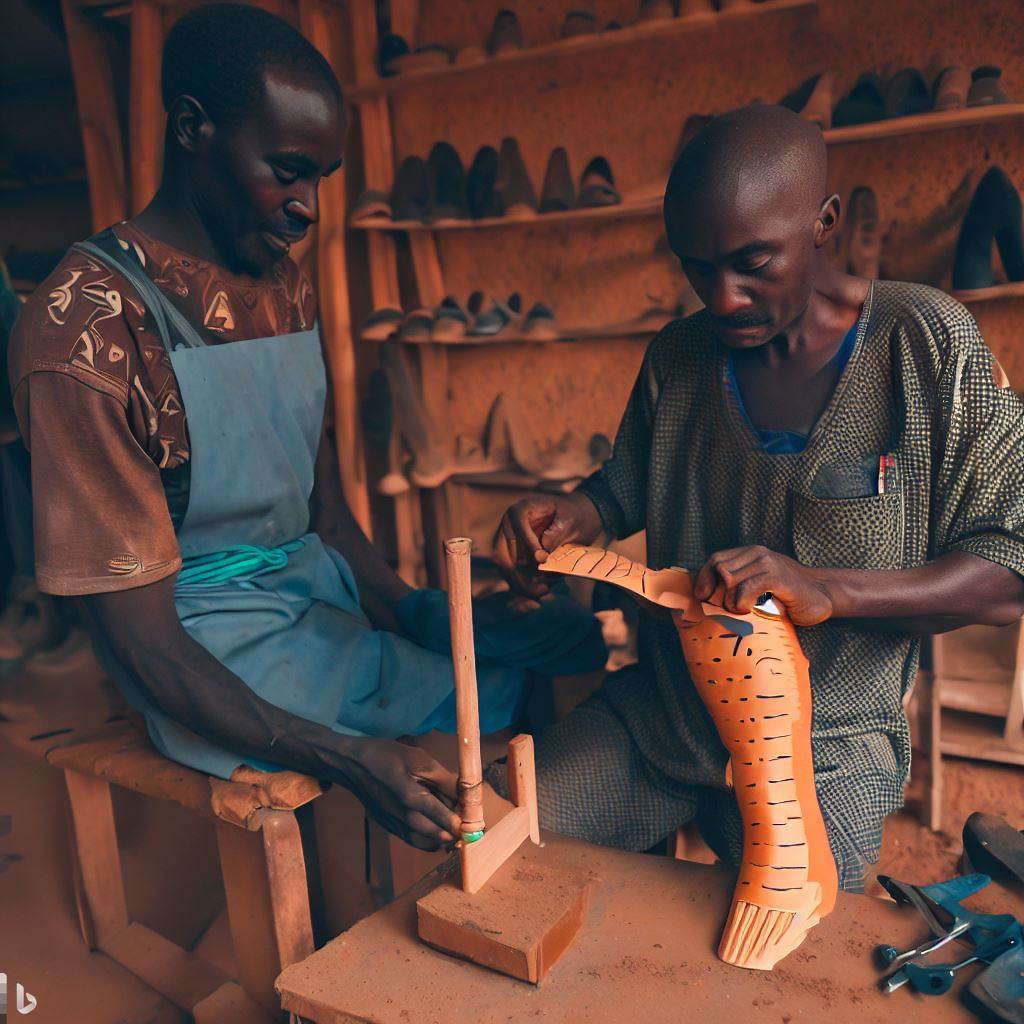Introduction
Orthotic and Prosthetic Associations refer to organizations that focus on improving the quality and accessibility of orthotic and prosthetic devices in Nigeria.
These associations play a crucial role in enhancing the lives of individuals with disabilities by providing necessary support and resources.
Orthotic and Prosthetic Associations are dedicated to improving the mobility and functionality of people with physical impairments. They aim to enhance the quality of life of individuals needing orthotic braces, prosthetic limbs, and other assistive devices.
By utilizing advancements in technology and research, these associations ensure that individuals have access to the most effective and comfortable devices available.
In Nigeria, Orthotic and Prosthetic Associations are of paramount importance. They address the specific needs and challenges faced by Nigerians with disabilities, considering cultural, economic, and social factors.
These associations provide education and training to healthcare professionals, ensuring that they have the necessary skills to provide appropriate orthotic and prosthetic care.
Furthermore, Orthotic and Prosthetic Associations advocate for the rights of individuals with disabilities in Nigeria. They work towards establishing policies and regulations that promote equal access to orthotic and prosthetic services.
These associations also collaborate with government agencies, non-governmental organizations, and international partners to improve the availability and affordability of orthotic and prosthetic devices in the country.
In review, Orthotic and Prosthetic Associations play a vital role in Nigeria by enhancing the lives of individuals with disabilities by providing effective orthotic and prosthetic devices.
Their efforts not only improve mobility and functionality but also promote inclusivity and equality for people with physical impairments.
Overview of Orthotic and Prosthetic Associations in Nigeria
In this section, we will provide a brief history of Orthotic and Prosthetic Associations in Nigeria, as well as the current status of these associations.
Brief History of Orthotic and Prosthetic Associations in Nigeria
The establishment of Orthotic and Prosthetic associations in Nigeria dates back to the early 1980s. These associations were founded to promote and advance the field of orthotics and prosthetics in the country.
Initially, there were only a few associations that focused on specific regions or states in Nigeria. However, with the growing recognition of the importance of orthotics and prosthetics, more associations were formed nationwide.
Over the years, these associations have played a vital role in the development and standardization of the profession. They have facilitated the exchange of knowledge and best practices among professionals in the field.
Orthotic and Prosthetic associations have also collaborated with international organizations to improve training and access to resources in Nigeria.
Through conferences, workshops, and seminars, these associations have promoted continuing education and professional development.
Furthermore, they have advocated for the rights of individuals with disabilities and worked towards creating a more inclusive society.
Current Status of Orthotic and Prosthetic Associations in Nigeria
Currently, there are several Orthotic and Prosthetic associations operating at both national and regional levels. The Nigerian Association of Orthotists and Prosthetists (NAO) is the leading national association in the country.
NAO works closely with the International Society for Prosthetics and Orthotics (ISPO) to ensure global standards are met. Other regional associations include the Lagos State Orthotists and Prosthetists Association (LASOPA) and the Abuja Orthotists and Prosthetists Association (AOPA).
These associations provide platforms for orthotic and prosthetic professionals to network and share expertise. They organize regular meetings, workshops, and conferences to facilitate professional development and knowledge dissemination.
The associations also collaborate with universities and training institutions to advance education and research in the field. Through advocacy and awareness campaigns, they aim to promote the role of orthotics and prosthetics in healthcare.
Despite the progress made, challenges such as limited funding and infrastructure constraints still exist. However, Orthotic and Prosthetic associations in Nigeria remain committed to overcoming these challenges and improving the profession.
In essence, Orthotic and Prosthetic associations in Nigeria have a rich history and play a crucial role in advancing the field.
These associations have contributed to the standardization of the profession, professional development of its members, and advocacy for individuals with disabilities.
Despite challenges, they continue to strive towards excellence and inclusivity in orthotics and prosthetics in Nigeria.
Benefits of Orthotic and Prosthetic Associations in Nigeria
Orthotic and prosthetic associations have several benefits for both practitioners and patients in Nigeria. Let’s take a closer look at each of these benefits:
Advocacy for patients’ rights
Orthotic and prosthetic associations in Nigeria serve as a voice for patients with disabilities. They advocate for the rights of these individuals, ensuring that they have access to the necessary orthotic and prosthetic devices and services.
Through their advocacy efforts, these associations promote inclusivity and equality in healthcare. By raising awareness about the importance of orthotic and prosthetic care, these associations work towards overcoming barriers and improving the quality of life for patients.
They lobby for policies and regulations that support the needs of individuals with disabilities, such as improved insurance coverage and reimbursement rates.
Professional development and education opportunities for orthotic and prosthetic practitioners
Orthotic and prosthetic associations in Nigeria provide various professional development and educational opportunities for practitioners. These programs help in improving their knowledge, skills, and competency in the field.
The associations organize workshops, seminars, conferences, and continuing education courses. These events cover a wide range of topics related to orthotic and prosthetic practice, including new techniques, emerging technologies, and research advancements.
By participating in these activities, practitioners stay up-to-date with the latest developments in the field. This ensures that they provide the best possible care to their patients, incorporating evidence-based practices and innovative solutions.
Standards and guidelines for the practice
Orthotic and prosthetic associations establish standards and guidelines that practitioners must follow. These guidelines ensure that orthotic and prosthetic interventions in Nigeria are safe, effective, and of high quality.
The associations work in collaboration with regulatory bodies and professional organizations to develop these standards. They take into account international best practices and adapt them to the Nigerian context.
By adhering to these standards, practitioners can provide consistent, evidence-based care. The guidelines cover areas such as assessment and evaluation, device selection and fitting, follow-up care, and maintenance and replacement of orthotic and prosthetic devices.
Collaboration and networking among industry professionals
Orthotic and prosthetic associations provide platforms for collaboration and networking among professionals in the field. These platforms allow for the exchange of knowledge, ideas, and experiences.
Practitioners can connect with colleagues, share innovative practices, and seek advice on challenging cases. Collaboration among professionals helps in advancing the field and improving patient outcomes.
These associations also foster interdisciplinary collaboration, bringing together orthotic and prosthetic practitioners, physical therapists, rehabilitation engineers, and other healthcare professionals.
This multidisciplinary approach allows for holistic care and better outcomes for patients.
Basically, orthotic and prosthetic associations in Nigeria offer numerous benefits for both practitioners and patients.
Through advocacy, professional development, establishment of standards, and collaboration, these associations contribute to the growth and advancement of orthotic and prosthetic practice in the country.
Major Orthotic and Prosthetic Associations in Nigeria
Nigerian Association of Orthotists and Prosthetists (NAOP)
In Nigeria, several major orthotic and prosthetic associations play a crucial role in advancing the field and supporting professionals.
The Nigerian Association of Orthotists and Prosthetists (NAOP) is one such leading association. It serves as a platform for orthotic and prosthetic professionals to connect, exchange knowledge, and contribute to the growth of the field.
NAOP membership offers various benefits, including opportunities for professional development and networking. To become a member of NAOP, individuals must possess a recognized qualification in orthotics and prosthetics.
This ensures that the association maintains a high standard of expertise among its members. NAOP also actively engages in initiatives and projects aimed at advancing the field in Nigeria.
By participating in research, collaborations, and training programs, NAOP contributes to the overall development of orthotic and prosthetic practices in the country.
Nigerian Prosthetic, Orthotic and Orthopaedic Technology Society (NPOOTS)
Another significant association in Nigeria is the Association of Nigerian Certified Orthotists and Prosthetists (NPOOTS).
NPOOTS focuses on the professional growth and development of its members. The association offers training and certification programs to enhance the skills and knowledge of orthotists, orthopaedicians, and prosthetists.
Membership in NPOOTS provides access to ongoing education and research opportunities, enabling professionals to stay updated with the latest advancements in the field.
NPOOTS sets specific certification requirements that individuals must fulfill to become members. By doing so, the association ensures that its members adhere to standardized practices and ethical conduct.
NPOOTS plays a crucial role in promoting professionalism and ensuring that orthotic and prosthetic services in Nigeria meet rigorous standards.
Nigerian Orthopedic Technician Association (NOTA)
The Nigerian Orthopedic Technician Association (NOTA) is another essential organization in the field. NOTA focuses on advancing orthopedic technology and supporting orthopedic technicians.
Membership in NOTA offers benefits such as career advancement opportunities and professional support. The association acts as a platform for orthopedic technicians to collaborate, share knowledge, and implement best practices.
To become a member of NOTA, individuals must meet the association’s membership requirements. By maintaining these standards, NOTA ensures that its members possess the necessary skills to provide high-quality orthopedic services.
The association actively contributes to the development and implementation of orthopedic technology in Nigeria, thereby enhancing the overall healthcare system.
In short, Nigeria is home to several major orthotic and prosthetic associations that drive the growth and development of the field.
Organizations like NAOP, NPOOTS, and NOTA aim to provide support, professional development opportunities, and standardization within the orthotic and prosthetic industry.
By joining these associations, professionals in Nigeria can enhance their skills, contribute to advancements, and uphold ethical practices in orthotic and prosthetic services.
Read: Qualifications Needed to Become a Psychologist in Nigeria

Challenges Faced by Orthotic and Prosthetic Associations in Nigeria
Orthotic and Prosthetic Associations in Nigeria are confronted with several challenges that hinder their mission to provide adequate support to individuals with disabilities.
These challenges include:
Limited funding and resources
The orthotic and prosthetic field in Nigeria suffers from insufficient financial support and a lack of resources necessary for effective operation. Without adequate funding, associations struggle to provide quality orthotic and prosthetic devices to those in need.
Lack of awareness and support from the government and public
Orthotic and prosthetic associations face an uphill battle in raising awareness about the importance of their services.
The government and the general public often lack understanding and appreciation for the crucial role these associations play in improving the lives of people with disabilities.
Shortage of qualified practitioners
There is a scarcity of well-trained and qualified orthotic and prosthetic practitioners in Nigeria.
This shortage makes it challenging for associations to meet the increasing demand for their services, resulting in longer wait times for individuals in need of orthotic and prosthetic devices.
These challenges pose significant obstacles to the progress and success of orthotic and prosthetic associations in Nigeria. However, they can be overcome through collective effort and support from various stakeholders.
What can be done?
Addressing the challenges faced by orthotic and prosthetic associations in Nigeria requires strategic solutions and collaborative efforts from different parties involved:
Increased funding and resource allocation
Government and private sector involvement is necessary to ensure sufficient funding and resources are available to orthotic and prosthetic associations. This includes investing in research, training programs, and the procurement of modern equipment.
Public awareness campaigns
Efforts should be made to educate the public about the benefits and importance of orthotic and prosthetic services.
These awareness campaigns can be conducted through media channels, community outreach programs, and collaborations with disability advocacy groups.
Expansion of training programs
Orthotic and prosthetic associations should collaborate with educational institutions to expand training programs for practitioners.
This will help address the shortage of qualified professionals and ensure the availability of skilled individuals to meet the growing demand for orthotic and prosthetic services.
Collaboration with international organizations
Orthotic and prosthetic associations in Nigeria can benefit from partnerships and collaborations with international organizations.
This can provide access to additional funding, resources, and knowledge-sharing opportunities to enhance their capacity and effectiveness.
In a nutshell, the challenges faced by orthotic and prosthetic associations in Nigeria are significant but not insurmountable.
With increased funding, awareness, and collaboration between various stakeholders, these associations can better serve individuals with disabilities and contribute to their overall well-being and inclusion in society.
Read: Career Switching to Occupational Therapy: A Nigerian Perspective
Success Stories of Orthotic and Prosthetic Associations in Nigeria
Orthotic and prosthetic associations in Nigeria have made significant strides in improving the lives of individuals with physical disabilities. Through impactful projects and initiatives, these associations have transformed the lives of countless patients and empowered practitioners.
Let’s explore some success stories that highlight the remarkable work being done.
Mobility Improvement Project: Enhancing Mobility for Children
One of the associations launched a project aimed at providing orthotic devices to children with mobility impairments. Through partnerships with local hospitals and NGOs, they were able to identify children in need and provide them with custom-made orthoses.
The impact was profound. Children who previously struggled to walk were now able to move independently, engage in physical activities, and attend school regularly. The project not only improved their physical well-being but also boosted their confidence and overall quality of life.
Amputee Empowerment Initiative: Empowering Amputees through Skills Training
In collaboration with vocational training centers, another association initiated a program to empower amputees with valuable skills.
These individuals were provided with prosthetic limbs, followed by comprehensive training in various trades such as carpentry, tailoring, and computer skills.
The testimonies from the beneficiaries were inspiring. Many of them not only became financially independent but also started their own businesses, employing others in similar situations.
The initiative not only restored their physical abilities but also gave them a new lease on life.
Polio Survivors Partnership: Addressing the Needs of Polio Survivors
Recognizing the unique challenges faced by polio survivors, a collaboration between multiple associations and the government was formed. This partnership focused on improving access to orthotic and prosthetic services specifically for individuals affected by polio.
Publish Your Professional Profile, Business or Brand
Showcase your expertise, gain trust, and boost visibility instantly on Professions.ng.
Publish NowAs a result, numerous polio survivors received highly specialized orthoses and prostheses tailored to their individual needs.
This led to increased mobility, reduced pain, and improved overall functionality. Additionally, the associations provided rehabilitation programs to help them adapt to their new devices and reintegrate into society.
Testimonial from Patient: A Life Transformed
One patient, who had a debilitating spinal cord injury, shared their experience with an orthotic association. After being fitted with a spinal orthosis, they regained the ability to sit upright and perform daily tasks independently.
According to the patient, the compassionate care and expertise of the association’s practitioners had a profound impact on their physical and mental well-being.
They expressed immense gratitude for the association’s support and credited them for their remarkable recovery and improved quality of life.
Testimonial from Practitioner: Making a Difference
A prosthetic practitioner shared their journey of working with an orthotic and prosthetic association. They highlighted the fulfillment they experienced in transforming the lives of individuals with limb loss.
The practitioner mentioned witnessing their patients regain their confidence, pursue their dreams, and embrace their new prosthetic limbs with pride. They emphasized the importance of continuous learning and collaboration among practitioners to provide the best possible care for their patients.
These success stories exemplify the significant impact of orthotic and prosthetic associations in Nigeria. Through their projects, initiatives, and dedication, they continue to improve the lives of individuals with physical disabilities, empowering them to overcome challenges and lead fulfilling lives.
Read: Nigeria’s Demand for Occupational Therapists: An Analysis
Strategies for Supporting Orthotic and Prosthetic Associations in Nigeria
In order to ensure the success and growth of orthotic and prosthetic associations in Nigeria, it is essential to implement effective strategies that can provide support and address the challenges they face.
The following are some strategies that can be employed:
Raising public awareness
One of the key strategies for supporting orthotic and prosthetic associations in Nigeria is to raise public awareness about the importance of orthotic and prosthetic care.
This can be done through various means, such as:
- Organizing public awareness campaigns to educate the general public about the benefits of orthotic and prosthetic devices.
- Collaborating with media outlets to spread awareness through television, radio, and social media platforms.
- Engaging with local communities and healthcare professionals to provide information and support regarding orthotic and prosthetic services.
Advocating for increased government support and funding
Another crucial strategy is to advocate for increased government support and funding for orthotic and prosthetic associations.
This can be achieved by:
- Collaborating with policymakers and government officials to highlight the importance of orthotic and prosthetic care in the overall healthcare system.
- Providing evidence-based research and data on the positive impact of orthotic and prosthetic interventions.
- Joining forces with other healthcare associations to collectively advocate for improved policies and funding allocation.
Encouraging collaboration and knowledge-sharing
Promoting collaboration and knowledge-sharing among different orthotic and prosthetic associations is also critical for their success.
This can be accomplished through:
- Organizing conferences, workshops, and seminars where professionals can exchange ideas, research findings, and best practices.
- Creating online platforms or forums for associations to communicate, share resources, and seek advice from each other.
- Establishing partnerships and mentorship programs to encourage experienced professionals to support and guide newcomers in the field.
By implementing these strategies, orthotic and prosthetic associations in Nigeria can benefit from increased awareness, support, and collaboration. This, in turn, can lead to improved services and outcomes for individuals who require orthotic and prosthetic care.
Read: The Current State of Pediatric Medicine in Nigeria
Conclusion
Orthotic and Prosthetic Associations in Nigeria play a significant role in improving the lives of individuals with physical disabilities. These associations provide crucial support and resources for those in need, facilitating access to orthotic and prosthetic devices.
It is important that these associations receive continued support and development to enhance their ability to serve individuals with disabilities effectively.
By offering financial assistance, volunteering, or advocating for these associations, readers can make a difference and contribute to the cause.
Together, we can help improve the quality of life for the disabled community in Nigeria and create a more inclusive society.




